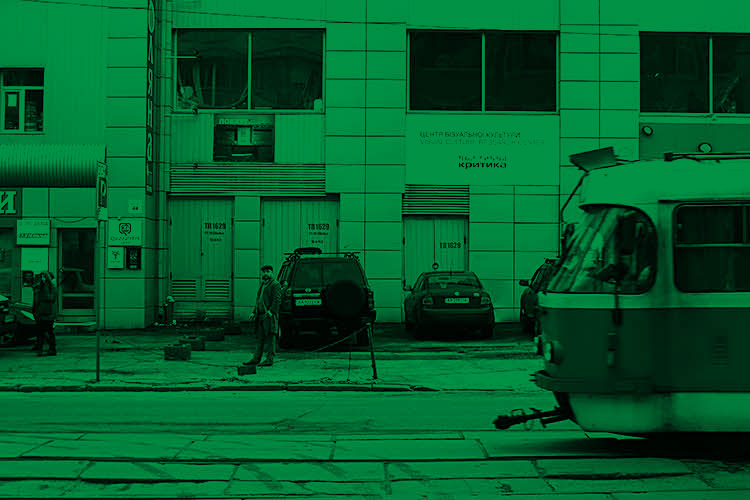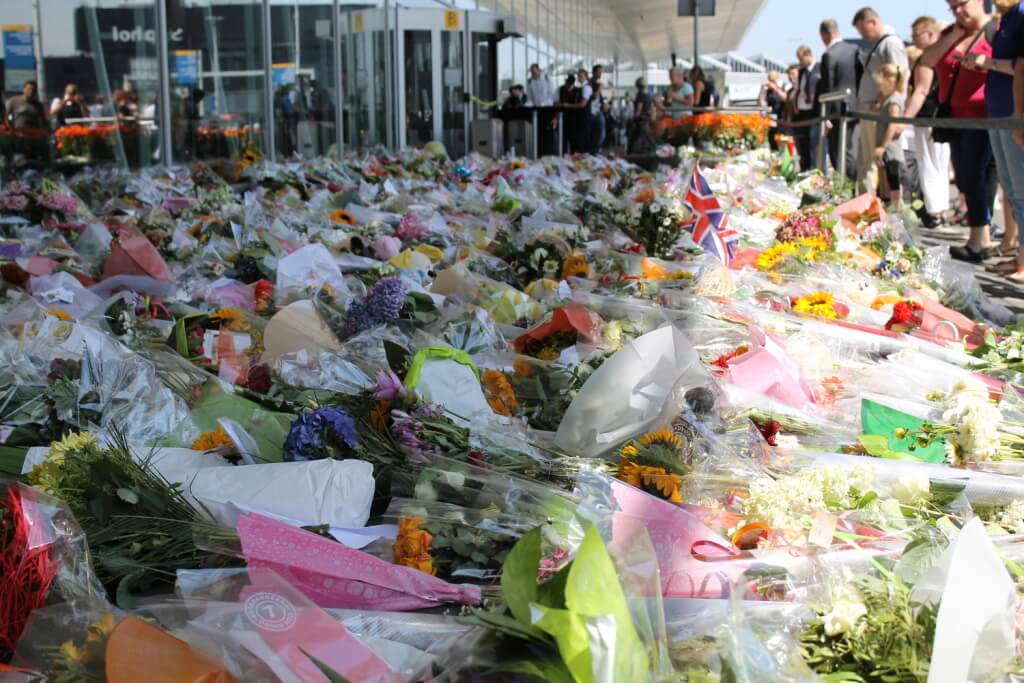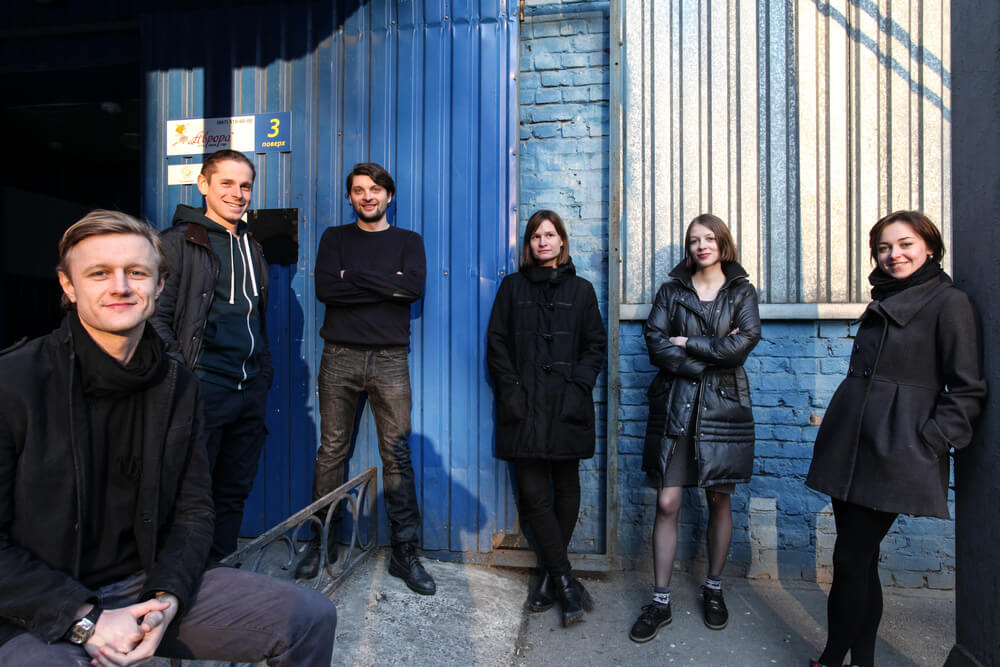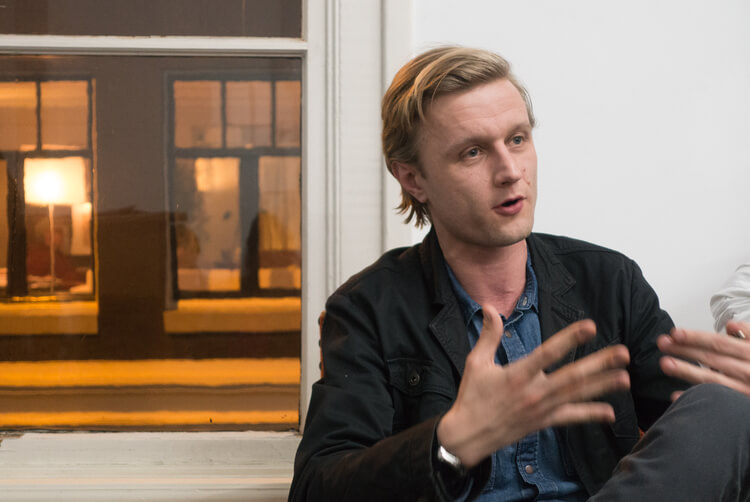Canan Marasligil, Friso Wiersum: Let’s start with last year’s ECF Princess Margriet Award for Culture, what did it mean to you? Did the Award in any way change your position within the political and cultural landscape of Ukraine?
Vasyl Cherepanyn: I feel nostalgic about being at the Award ceremony again, this time celebrating new laureates. As for the impact on our work, I can speak from both a personal and an institutional perspective. I feel that ECF makes very precise political choices with every Award, which is unique among cultural institutions in the EU. While many organisations are trying to remain in the middle, it seems there is a more dedicated choice on ECF’s part. It is important that international organisations choose to follow this line, it is a performative gesture which has a long-running impact on a European scale. So yes, the Award does influence a laureate’s work, it makes it visible on an international level, and moreover, it gives the feeling that “you’re not alone, somebody sees you”.
It is political in the physical sense too. The Award is made through the trespassing of borders – last year and in previous Awards, it was the very act of the local cultural actors trespassing into Brussels, re-appropriating the capital, which I find admirable, or bringing those voices from Hungary and Spain into the Netherlands this year. It can, next to that performative dimension, provoke and give birth to outcomes never imagined.
This choice is also connecting those who are awarded. ECF chooses people working in different contexts, but somehow representing a new type of collective. Together, all laureates show a map of new political subjectivity. All these collectives and individuals have a similar political habitus, even if they come from a variety of cultural environments, which is important and powerful on a European level.
Some far-right organisations in Ukraine have been opposing you [Vasyl Cherepanyn got heavily beaten in 2014 eds.], did the Award make any difference in how your work is perceived now?
Vasyl CHEREPANYN
is a director of the Visual Culture Research Center (Kyiv, Ukraine), the institutional organiser of The School of Kyiv – Kyiv Biennial 2015, editor-in-chief of Ukrainian Political Critique magazine.I think the influence of the Award is more subtle. The benefits of winning the Award are not for the immediate future, but for the longer run. There with the Award isn’t a populist instrument, with populists always focusing on the immediate future. Populism is a “democratic seduction”, populists seem active and radical because they use direct force, but it is Ersatz politics. It’s a one-step action and it’s not radical in the sense that it offers an alternative. An award like this is therefore more radical.
But most importantly, also thanks to the Award, together with the curators Georg Schöllhammer and Hedwig Saxenhuber from Vienna we started the Kyiv biennial The School of Kyiv, which presented a new format of an art biennial integrating exhibitions and arenas of public reflection. Works of more than hundred international and Ukrainian artists were shown in an open display structure, including six Schools, where artists and intellectuals from around the world met and worked with the public in collaborative forums.

What was the intention of organising The School of Kyiv biennial?
The title itself shows the motivation, and it works on a local as well as on an international level. It is the school of Maidan, the school of revolution. Maidan was made by masses, and one could see it as a process unfolding in front of one’s eyes. That’s why it was so important for Europe – it was like from the classic history, the basics of how Europe was born. Even the EU flag – the symbol of Euro-bureaucrats and transnational financial power – was transformed in Ukraine into the revolutionary flag, which has won. The idea of Europe was reborn on Maidan. With the School of Kyiv biennial, we tried to narrate the political subjectivity of Maidan and translate its message to the outside, because it contains a very important social experience and political practice for Europe, which can be the key to solve many of the current European issues. We don’t have Ukrainian problems; we have common European problems. The main challenge for the EU is that it is trying to keep its ‘centre’ safe and externalise all the problems beyond the European wall. As a result, you will have warfares and conflicts around – the EU now is surrounded by a belt of wars in its South and East, – and terrorist attacks and “refugee crisis”, which I think is a totally misleading term, as a ‘collateral damage’ inside. It is not a refugee crisis, it is the crisis of European politics.
On a place like Maidan, you could see links between people full of hope, able to connect to one another. How has this idea of commoning been involved in Ukrainian political events?
Maidan was really a melting pot, lots of initiatives and organisations emerged directly on the square. Commoning is a work-in-progress, and unfortunately the war from the Russian side prevented us from taking our time after the revolution. It appeared after Maidan that the state of Ukraine had been ruined: there was no real state structure, that’s why civil organisations and social centres have been playing an important role, taking care of the regular army, of refugees and escapers from the warfare [from the Crimea and Donbas, eds.] They are making all the sustainable social work which allows Ukraine as a country to exist. In this case, we can talk about biopolitics in the literal sense.
Maidan itself was a process of commoning. Imagine people in the hundreds of thousands start working as a coherent organism to get rid of the bloody regime, launch a new political process and constitute justice, – they just came and did it! It was like a political miracle which showed, that democracy, freedom, and justice are not just ‘values’ but basic needs.
On 6 April, Dutch citizens will be asked if they are “for or against the Association Agreement between the European Union and Ukraine?” How does that make you feel?
It’s such a big mistake that Ukraine is not already a member state. If the EU wants to survive and sustain itself in the future, it unavoidably has to include Ukraine and the sooner the better. Ukraine is an ace up Europe’s sleeve, a sort of a ‘ground zero’ guarantee for the persistence of the EU. Ukraine will become part of the Union anyway, I’m sure about that, today it is rather the question whether the EU itself will survive by the time Ukraine will be supposed to join. In Ukraine you have the biggest army of EU enthusiasts in Europe, there is even no need to do something or convince anybody for that. The EU has to think about creating conditions, when its principles and rules are applicable and practiced on the whole European continent.
Europe needs a Re-Union. The current model of the EU has to be renewed in order to be able to deal with the new global political challenges, and Ukraine is a key for the new ‘European International’. Ukraine as a member state is the best protection of the European idea. The centre of Europe is on Maidan.
I think this referendum is one big fallacy. The right question to be asked is what does one try to repress through putting such votes to the public forefront, what is on the background? Usually votes of that kind serve as a litmus paper to test the level of support of the national or EU authorities regardless of the issue taken to a vote, and people vote against the ruling classes. BREXIT is another example. It’s all about the societies expressing their inability to act. The referendum is in reality a Dutch problem, Ukraine is just the weakest victim or a soft spot, an empty screen to project local frustrations. The referendum has appeared as an issue in that form because of the difficulty for the Dutch society to express its pain in a political way. The problem silenced through this referendum is the MH17 crash – that’s the main reason to question the referendum as such.

Currently, with two options to vote, there are four groups to discern in Dutch society: the ones in favour of the agreement and willing to go out and vote and pass the 30 percent voter barrier, the ones in favour of the agreement but reluctant to go vote (with the barrier not reached the government can lay aside the referendum results), the ones opposing the agreement and willing to go out and vote, and those who oppose the agreement but not interested in the vote itself. How would you address each of these groups?
The reasons why the Dutch citizens have either to boycott the referendum or vote for Ukraine are pretty clear. First of all, because it will be a powerful statement and a demand of an international scale that justice has to be accomplished and the killers of the MH17 passengers must appear in court and be punished, and we will never forget this crime and excuse the political regime that is responsible for it. It’s inexcusable.
Shooting down the plane is one of the ugliest terrorist acts of the recent years and a real face of the Russian military occupation of Ukrainian territories. The Netherlands and Ukraine have both suffered human losses in one war, Dutch and Ukrainian people share the same pain. That’s why being for Ukraine is an anti-war position. It is the second basic reason – voting for Ukraine is voting against the war launched next to the EU doors to hit it, to split Europe and turn it into the set of separated neo-feudal kingdoms fighting with each other. By crashing the MH17 airplane, the killers aimed at crashing the European Union, as the ones in Paris, they attacked the very possibility of Europe to be a common homeland for people of different citizenship.
Now we see the ‘peripheries’, South and East, become more and more decisive for the future of the EU. The vision of what Europe is from the perspective of its margins is transforming its current EU embodiment. But the very reason why the EU was created still remains the main task of the highest importance for Europe today: to stop and prevent wars. And this war is not just against Ukraine, this war – as well as the terror war – is against Europe.
The third fundamental reason for the Dutch support of Ukraine is because Maidan is Dam square. It was the anti-imperial revolt that gave birth to the foundation of the modern Netherlands in the 16th century. A barricade as the main political tool and symbol of Maidan-Occupy in Ukraine follows the same logic as the idea of Dam square in the context of the Dutch Republic: both mean “we have settled here, this space is public, and we will not give it up”. Sometimes to generate political agora one has to set up a barricade or a Dam first. This is also the basis for the liberties, rights, and legal mechanisms of protection that have been elaborated to fulfil its aim.
What role do you think culture has inside the political struggle?
Culture is in the nature of it all. Imagery, art, visibility: visual culture can provide revolutionary tools, Maidan itself was a visual revolution, one of the most powerful images Ukraine ever produced. Such a fusion between politics and aesthetics creates a ‘social sculpture’ in Joseph Beuys’ sense, a situation when every political gesture unavoidably has an aesthetical dimension, and vice versa.
Also, culture is still providing an advantage to act and to pose those questions and issues which are impossible to voice in other social fields. This is basically what makes culture political. Media field and professional party politics are corrupted enough and can be easily influenced by economic forces, and in culture you can still act in the longer run. It is very hard but highly needed in the mainstream politics today.
Are cultural artefacts able to feed the imaginations of people?
Culture as a social field provides a very important political method which is documentarism: today, document has the status of main proof. Culture creates a setup, mediates the events, produces all types of documentation and documentaries. The responsibility relies on archiving. Working with raw material of reality, we are responsible for our own archives.

Is VCRC filling this role?
The Visual Cultural Research Center as an institution and The School of Kyiv as our project are meant to function as a translation machine in the political sense, – as a vehicle to translate political experiences and social practices on the international level, building common tools to work with. A new vocabulary, a new political language which can define our emotions, map the affects that drive us, and let us express ourselves in a precise way is one of the key issues at stake today. That’s why we had different schools within the biennial – the School of the Lonesome, of Realism, of the Displaced, of Landscape, of Abducted Europe, and of Image and Evidence, – with which we tried to indicate basic political emotions of nowadays and find proper words to express them. In fact, we need a common European vocabulary; it is the basis to make the understanding of our different experiences possible and to reflect on the solutions of our common European problems without hiding social reality.
What would you like to say to the Dutch cultural actors?
If civilisation, according to Huizinga, arises as play, and never leaves it, and if Europe is a play, we have to work together on making the rules of the European game equal and fair for all the Europeans today according to the fair play.
***
The interview was conducted by ECF and initially published on culturalfoundation.eu.
![Political Critique [DISCONTINUED]](http://politicalcritique.org/wp-content/uploads/2015/09/Political-Critique-LOGO.png)
![Political Critique [DISCONTINUED]](http://politicalcritique.org/wp-content/uploads/2015/09/Political-Critique-LOGO-2.png)
